Wolf Pack

What a packed month this has been



A big thank you to Ms. Ursula for supporting this endeavour along with the Literacy Committee. Thank you to all the parent readers, it was great to have you read in your native languages. I look forward to building on this with mother tongue clubs in the new academic year, if you are interested in supporting this idea, please contact Ms. Mia. Read more about Literacy Week on Page 17 and 18.
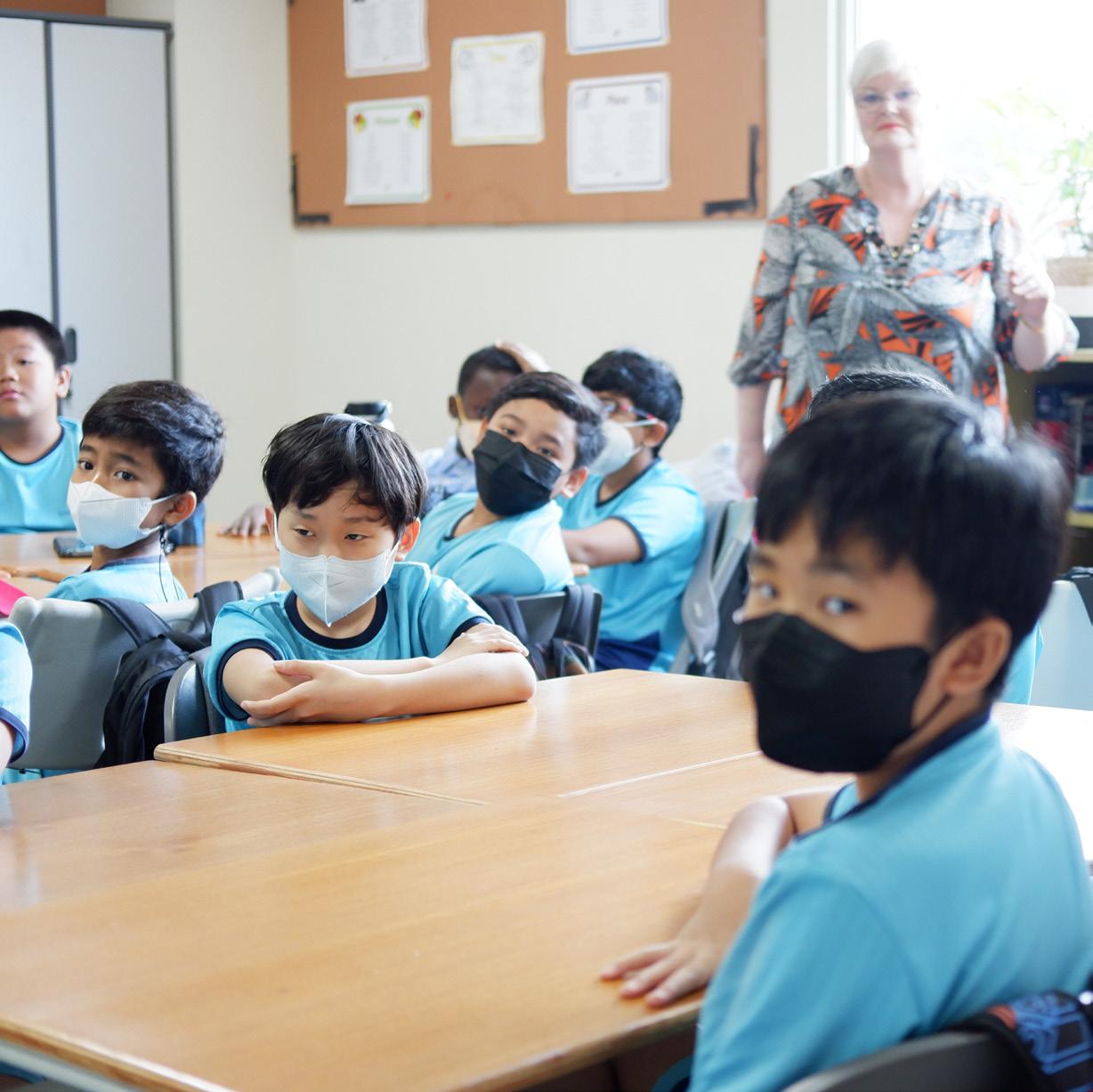


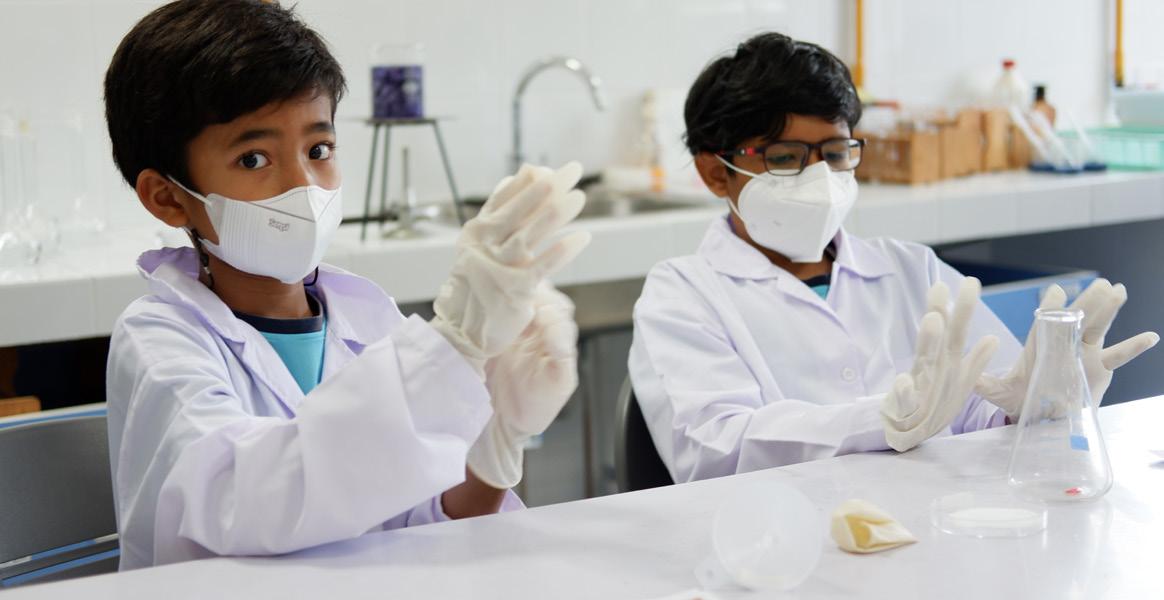


ISSUE NO.08 / 2022 T H E
The ACG School Jakarta Interactive Newsletter
Message from the Principal
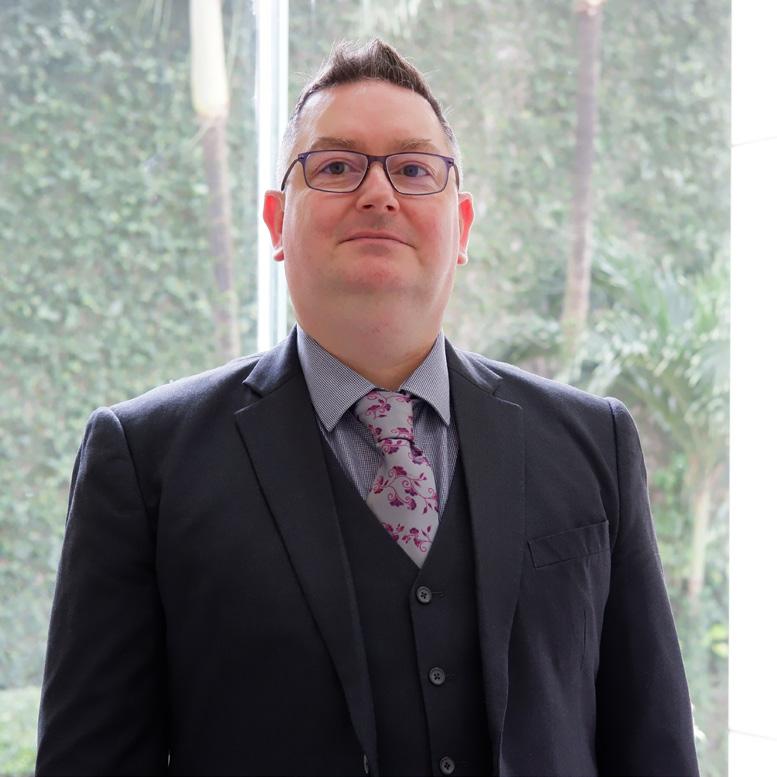
Dear Parents, Caregivers and Students,
Rather than discussing the wonderful things which you will find inside; the amazing Professional Development which is happening for our faculty, or the teaching and learning which our teachers and students are actively engaged in, I thought I would take a few moments to post a point about education which have been popping up in the news recently. I get educational trends and updates from a number of sources; Cambridge, IBO and a number of others, but one which I have had heard speak a few times is Michael McQueen. Our world that is becoming more and more futuristic by the minute, in education our attention is needed as innovations and changes place urgent demands on the knowledge and skills of today’s students - the ones who will actually inhabit the future that is approaching. Today’s students need to be equipped with adaptable skills for their unpredictable futures. Technologies like ChatGPT are infiltrating the classrooms and this means integrating innovation and creativity in the classroom.
We need to realise that while new technologies undeniably present challenges to teachers, there is also an array of opportunities to be found within them. Finding them, however, requires a posture of creativity and a willingness to move with the tides rather than fight them.
To this end, a question can be posed…
Technology, including ChatGPT, is here to stay. How might we work with it, not against it?
It seems that everywhere, ChatGPT is stirring up buzz and controversy, not least in conversations among educators. The obvious and pressing concern is cheating, and how easy this technology makes it for students. ChatGPT’s current ability to avoid the detection of plagiarism software and its often flawless replication of decent essay writing means educators are left fairly powerless in fighting the technology. There have been some excellent examples emerge, however, of educators uncovering ways of working with the technology in their teaching, rather than against it. Lecturers from the University of Sydney recently made the news with their move to incorporate ChatGPT into their assessments of medical students, in a way that continues to engage students’ critical thinking.
Students were asked to craft an essay question about contemporary medical challenges and pose it to ChatGPT. They then had to analyse and edit its response and submit a final draft for marking, with their changes to the robot’s work highlighted. While their ability to reproduce information may have been replaced by the technology, their critical analysis, judgement and
2 | ACG JKT March Newsletter
Myles D’Airelle
Message from the Principal
creativity were still prioritised and assessed.[1]
The reality is that in an age of constant internet access and AI-enabled synthesis, the memorisation of information is superfluous. Examining these skills becomes an irrelevant assessment. However, discerning between information and misinformation, critically analysing an argument and creatively improving it, are skills which will be crucial for these students in the society they are stepping into.
It is important for educators to see technology not as a hindrance to learning, but as a real part of the world students are walking into. Students need to be prepared and equipped to live in world in which these technologies will be an everyday reality, which means integrating them into the classroom is not only novel, but necessary. Doing so becomes possible when they are seen as something that can be collaborated with rather than simply contested.
We aim to support students develop those skills which allow them to understand the impacts of new technologies and how important it is to have analytical and evaluation skills to determine how well new technologies are helping us.
Warm regards
Myles D’Airelle Principal
March Newsletter ACG JKT | 3
Vice PrincipalMessage from the
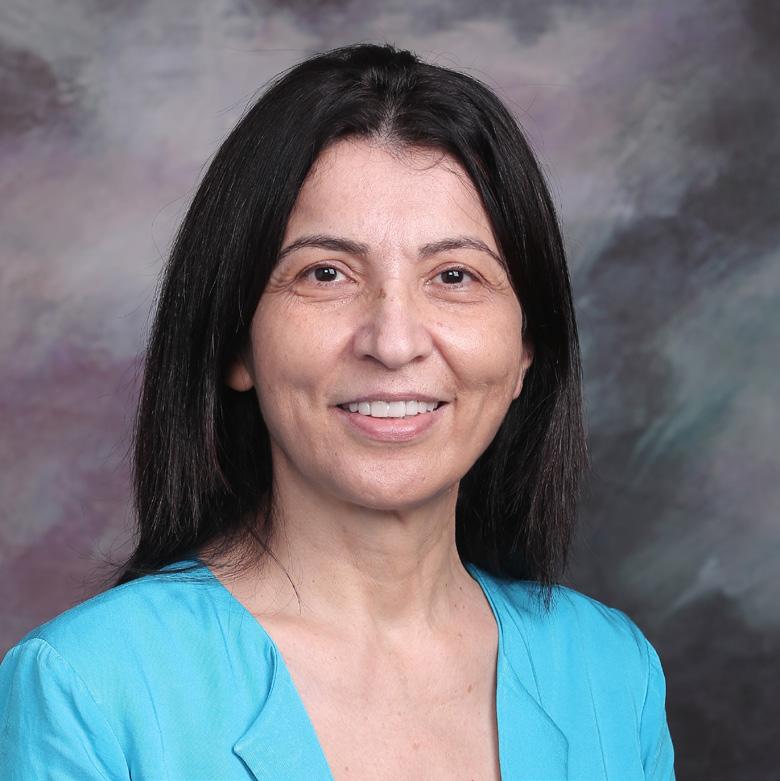
Dear Parents, Caregivers and Students,
“ACG School Jakarta is a diverse community of learners who are open-minded, responsible and caring. We inquire into the world around us through academic programmes that aim to prepare students for life’s opportunities. With an understanding of and respect for others and the environment, we actively strive to make a difference, locally and globally.” (ACG School Jakarta Mission)
The IB programme standards and practices (PSP) are designed to support schools as ‘learning organizations’.
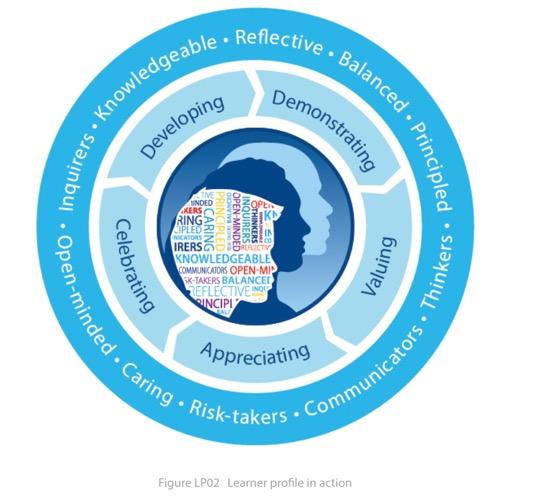
• In other words, as an IB World School community, we strive to be:
• Inquirers: We nurture our curiosity, developing skills for inquiry and research. We know how to learn independently and with others. We learn with enthusiasm and sustain our love of learning throughout life.”
• Knowledgeable: We develop and use conceptual understanding, exploring knowledge across a range of disciplines. We engage with issues and ideas that have local and global signifcance.”
• Reflective: We thoughtfully consider the world and our own ideas and experience. We work to understand our strengths and weaknesses in order to support our learning and personal development.”(IB
Profile)
Learner
As such, throughout the year, we participate in various learning events for educators. For example, all our staff, including our bus drivers, recently completed a suit of workshops on Child Protection and Safeguarding, designed to provide international educational settings with a thorough insight into child protection, how to recognise early signs that might indicate a problem, and how to take appropriate action.
In previous months, several ACGJS Secondary teachers attended official IB DP workshops to align our implementation with updates to the curriculum. March and April are busy months for some of our Primary teachers as they participate in official IB PYP workshops. These professional development events offer participants a unique opportunity to learn and reflect with, network, share experiences and best practices with other teachers around the world.
4 | ACG JKT March Newsletter
Selda Mansur
Vice PrincipalMessage from the
In March, our SEN (Special Education Needs) and Inclusion Coordinator participated in the SENIA (Special Education Network and Inclusion Association) Local Jakarta Chapter Conference 2023, titled “Bridging Connections Within Our Community”, which gave the participants an opportunity to network and confer over inclusive practices, differentiation in the classroom, and ideas on how educators can best support students with diverse learning needs.
ACG Jakarta School Academic Leadership Team attended the IB Global Conference in March 2023, which focused on the theme “Education for an inclusive future”, on how IB schools “embrace diversity and nurture a culture of inclusion” by developing a comprehensive diversity and inclusion policy that explicitly states the school’s commitment to creating an inclusive environment for all students, staff, and community members. In addition to gaining fresh perspectives on our teaching practice and getting updates about IB programmes, this conference also affirmed that we are on the right track regarding our preparations for the upcoming IB PYP-DP Evaluation.
Within our school, our teaching and administration staff continued learning with and from each other, through our weekly IB Evaluation Self-study group meetings, and we held a workshop for our bus drivers and chaperones, the details of which you can read in the following pages.
May your life be filled with continuous new learning, reflection, un-learning, and re-learning,
Selda Mansur Vice principal and PYP coordinator
March Newsletter ACG JKT | 5
Coordinator Message from IB Diploma
Dear Parents, Caregivers and Students,
I hope that everyone had a pleasant break and I wish everyone who is fasting the best of luck during Ramadhan. Usually for the Year 13s, these breaks are busy with exam preparation and finishing IAs, as they head toward their final examinations. I do hope that they were able to get some rest!
Year 12 – The Year 12 cohort are nearing the end of their first year of the DP. This term, Diploma students are prioritizing their Extended Essay (EE), which we aim to have completed during Term 1 of the next academic year. It is vitally important to keep on track with this, as there are many Internal Assessments next year. Finishing the EE early makes life in Year 13 much easier!
Year 13- The Year 13s are in the most challenging part of the program, with IAs being finished and submitted, and examinations around the corner in May. Some components have already been submitted for marking, including the EEs, TOK essays, Visual Art Comparative Studies and HL Language A essays. Congratulations to all students for submitting these before the deadline and to their teachers for their support. Many teachers contacted and ran video consultations with students during their holidays, so I’d like to thank them for their dedication and support.
Teachers are busy preparing the classes for their upcoming exams, prior to the Y13 Study Leave from the 14th of April. Students are welcome to come to school if they wish to study or to meet with their teachers for additional support.
This is always a challenging and stressful time for the Year 13s, so please reach out to your child’s advisory teacher or me if you have any concerns regarding their wellbeing. It’s important that students get adequate sleep and balance their free time with some physical activity and enjoyable activities.
I wish everyone the best of luck with their preparations and please contact me if you have any questions or concerns.
Kieran Pascoe IBDP Coordinator
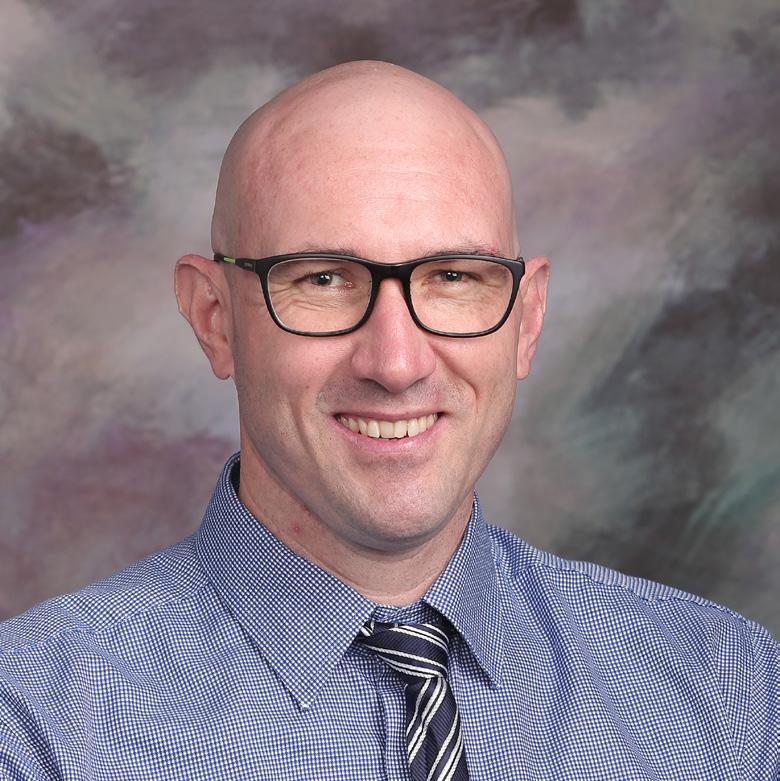
6 | ACG JKT March Newsletter
Kieran Pascoe
A community of entrepreneurial and compassionate learners
ACG School Jakarta as a learning organization
As we continue with our preparations for the upcoming IB Evaluation, our self-study groups which have members from different sections of the school teaching and administration teams, together with our Academic Leadership Team, are working on what the IB calls Programme Development Plans,
“The primary aim of this continuous reflective process in a school is to ensure that it is always developing the capacity to have a greater impact on student outcomes through the development of teacher and leader practice. Schools engage in collaborative reflection to deepen their understanding of what works well within their context and what needs further development. This supports the school as a learning community to develop intentionally and strategically so that resources and efforts can be allocated effectively.”
Being an IB World School means viewing the school as an evolving system. We need to continually, consistently, intensely, systematically and professionally inquire into how we can better meet the needs of the students in a rapidly changing world. While lofty ideals for an ideal school are good things to keep in mind, we seek to find ways to improve teaching and learning with a few carefully constructed goals that are relevant within our school’s context.
Although the IB team will be visiting our school to evaluate our PYP (Primary Years Programme) and DP (Diploma Programme) implementation, all our Secondary Cambridge International curriculum framework and IGCSE teachers are working on the Self-study teams and our work aims at whole-school development, not just PYP and DP years. With this in mind, we are reflecting on and looking for better ways to map and improve our curriculum from Kindergarten through to Year 13.
In the coming weeks and months, we will be reaching out to our students and their parents, to further inform and involve you in our Programme Development Plan design and implementation.

ACG JKT | 7 March Newsletter
Safety, respect, and kindness
For children, learning continues outside the school walls, and they need safe and respectful environments within and outside the school
A few weeks ago, a parent who is interested in registering her child in our school said: “Every morning, I see many children in our residential compound getting on their school buses. I have been noticing that the ACG School Bus Chaperone is so friendly and helpful to the children on her bus, and greets them with kindness and a cheerful attitude. That’s why I chose ACGJ, now that my child is old enough to go to Kindergarten,’
We organized a workshop for our bus drivers and chaperones, to celebrate this genuine expression of appreciation. Vice Principal Selda Mansur, Operations Coordinator Tia Kristianti and General Administrative Assistant Mia Sari, facilitated a discussion to explore the roles and responsibilities of bus drivers and chaperones and to look for ways to ensure consistent quality in our bus services.
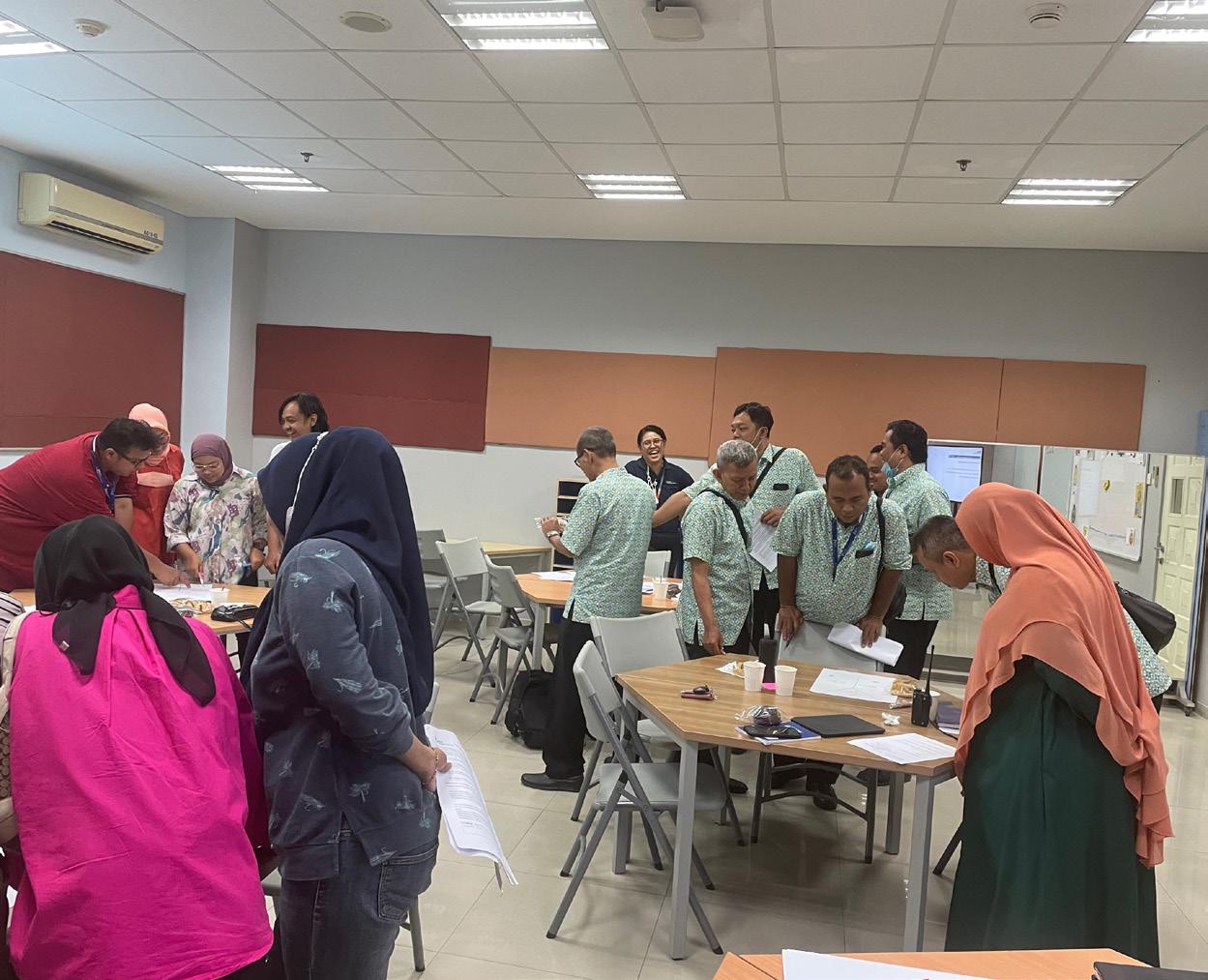
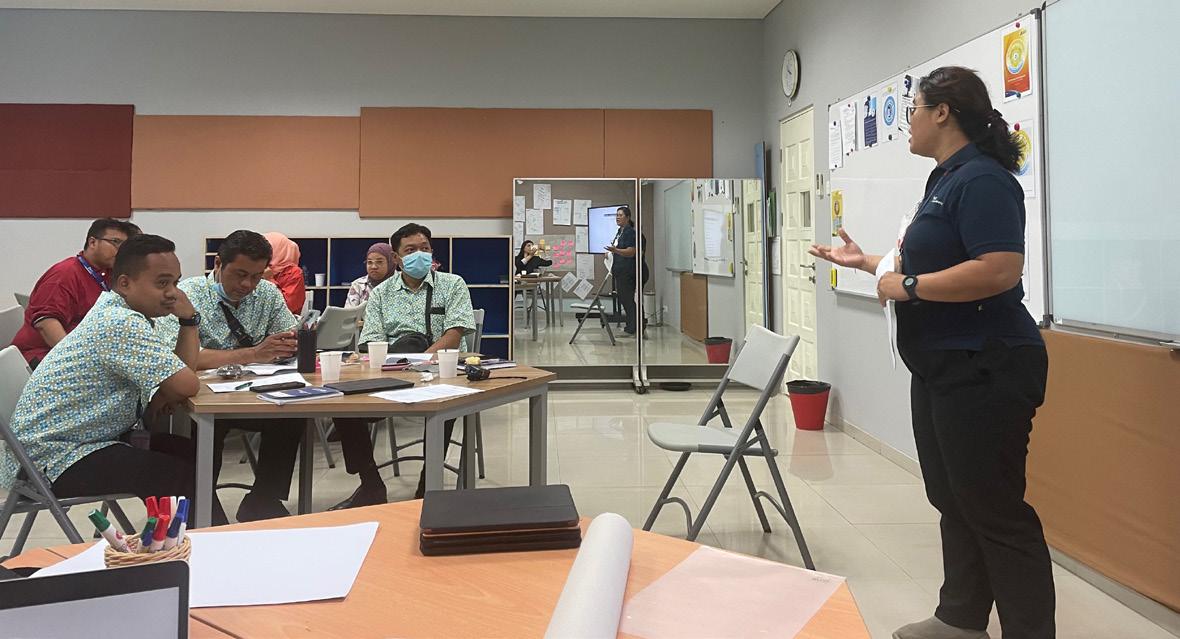

We reflected on our school mission as well as the IB’s, examined ACGSJ school bus rules and bus chaperone job description, searched for relevant information and examples from schools around the world on the internet, and discussed

• how our transport staff can model the IB Learner Profile attributes,
• what skills help them to create a safe and respectful environment on the bus,
• how to be vigilant when it comes to child protection and safeguarding, as children and young people can be at risk from others, but they can also put themselves at risk,
• how to ensure bus drivers and chaperones can contribute to the students’ learning process by being role models and encouraging a growth mindset and student agency.
8 | ACG JKT March Newsletter
Safety, respect, and kindness
While discussing roles and responsibilities, there was a unanimous agreement that the transport teams’ first and foremost job is to ensure the safety of the children. With this in mind, we examined some scenarios such as a traffic jam, a child vomiting on the bus, a parent wanting to come on the bus with their child, etc. and what to do in such situations.

One of the takeaways for our transport staff was that they do more than drive students to and from school—they form relationships with them. That they are role models for the children. That they are tasked with not entertaining but facilitating positive interactions among students, and ensuring there is a climate of safety and respect on the bus.
One aspect where parents can make a positive contribution to our bus service is to ensure children can deal with boredom. It is a life skill to occupy oneself, and not to rely on others for entertainment. Children need help to develop that skill. They can try and decide for themselves what they want to do with their time on the bus (reading, sharing stories or poetry with each other without making noise, exchanging notes, playing bus games such as spotting licence plates, etc) and we would appreciate it if you can also support that with discussions at home.
If you would like more information on our transport services, please visit our school website: https://www.jakarta.acgedu.com/school-information/transport and p. 16 of our Parent and Student Handbook https://www.jakarta.acgedu.com/school-information/schoolnewsletter .

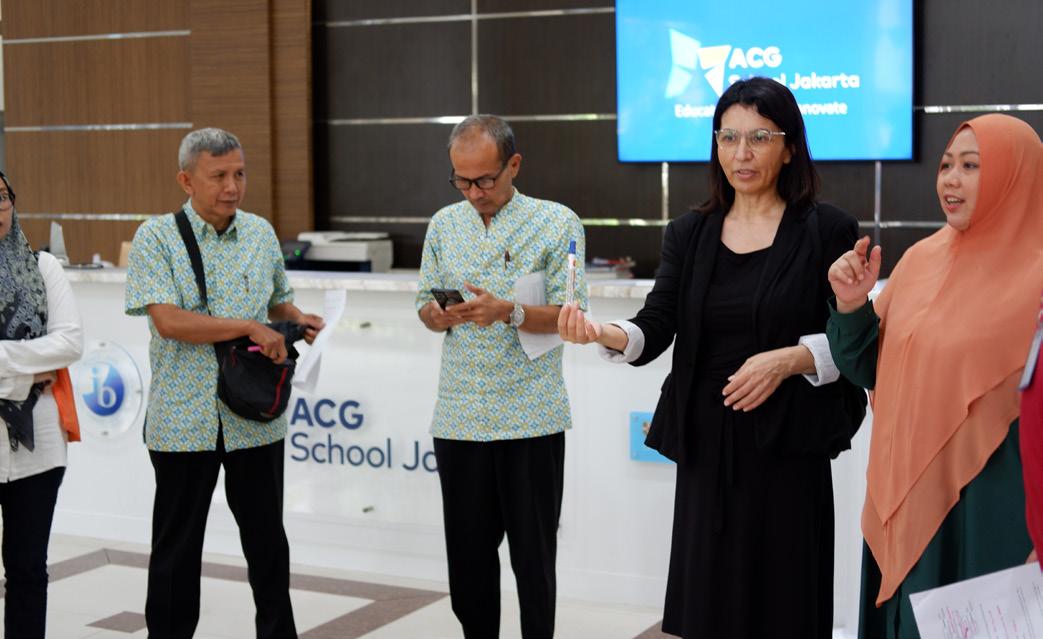

ACG JKT | 9 March Newsletter
Moving from primary to secondary school is an exciting time for students and parents. To help prepare our Year 6 parents we held a Transition to Secondary School information session, on 13 February 2023, to provide key information about our lower secondary programme, and the ways that secondary school may be different.
On 28 February we invited our Year 6 class, and a new student, to join a Year 6 Transition Day, where students got to experience some of the subjects: English, Mathematics, Science, PE, Design Technology and Drama, taught by the secondary teachers. The class then joined a Q & A session where they asked the Year 7 student ambassadors: Sally Miski, Jeong-Hyeop Lee, Indira Widjaja and Ananias Asona some burning questions about what to expect in Year 7.
It seemed like the Year 6 students are looking forward to taking their next steps on their learning journey, and we’re all excited in secondary to welcoming them all in August 2023.


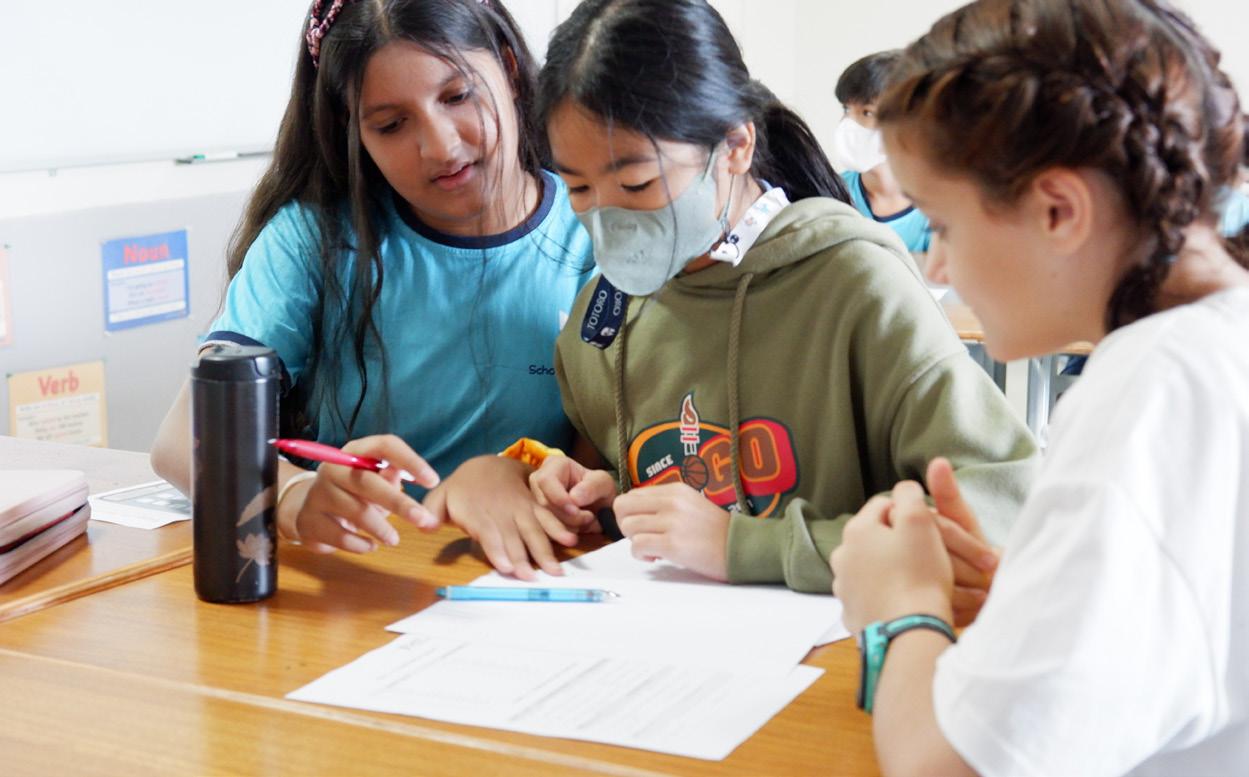

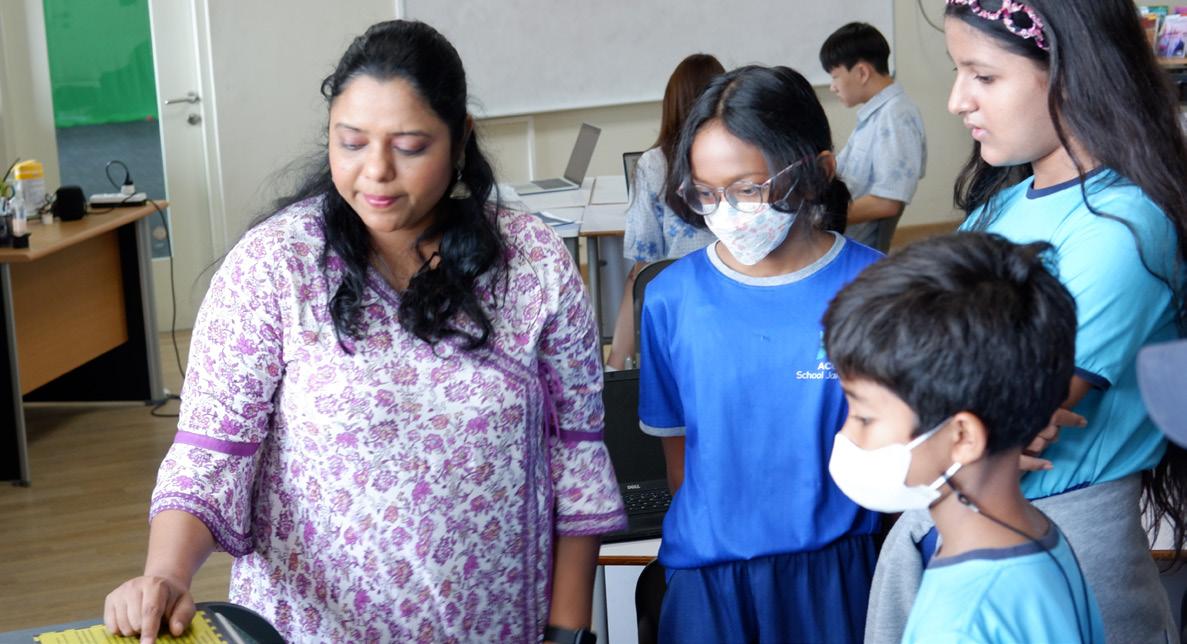
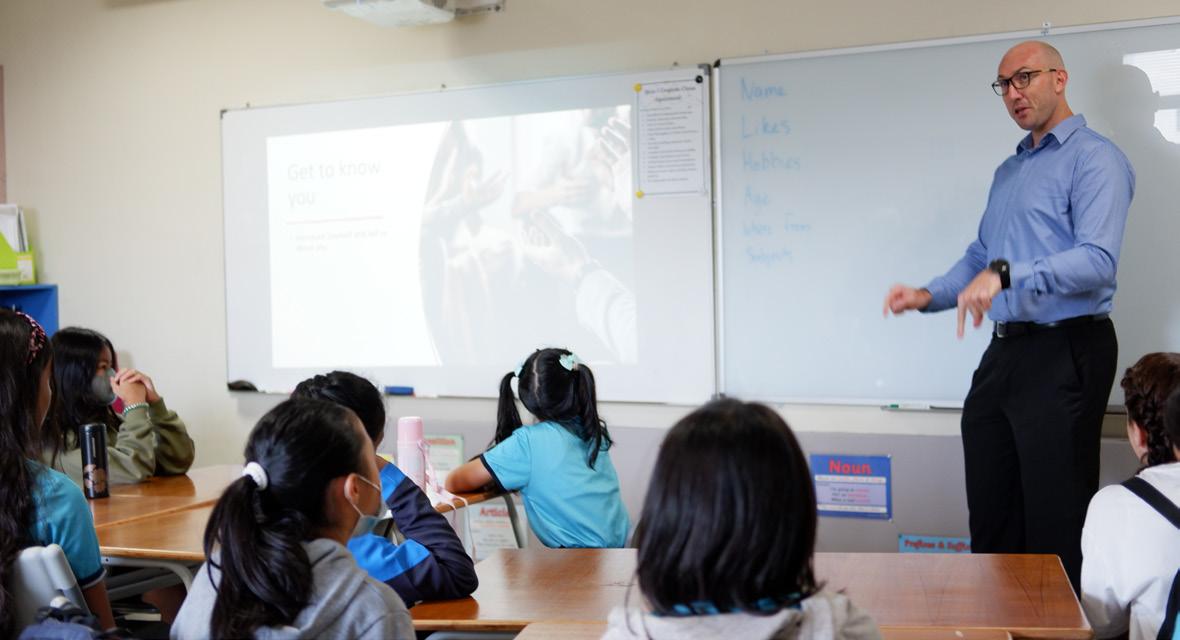
10 | ACG JKT March Newsletter LEARNING IN YEAR 6
See more photograph of the activity here
During advisory, we did a fun team building activity with blocks. The Year 12 students were asked to build famous buildings from all over the world and Ms Hisken and Mr McPhee had to guess which building it was. The students built the Eiffel Tower, the Golden Gate Bridge, the Burj Khalifa, their future university building and many more!



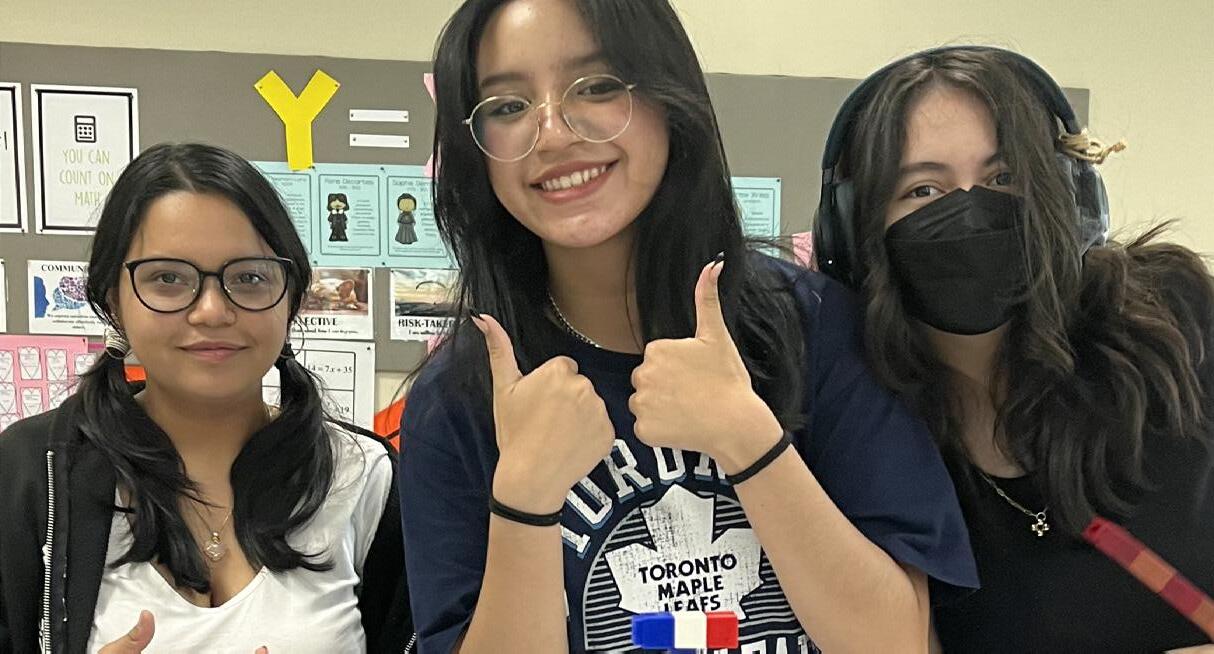

In Year 12 and Year 13, as part of the IB Diploma Programme, our math students investigate an area of mathematics that is of interest to them and write a report about it. To prepare for this task, the Year 10 students practiced with a mini investigation about the different can sizes of soft drinks. They compared the 250ml can of Coca-Cola to the 250ml can of Red Bull. The students were very engaged in exploring and answering questions such as: “for which can is more aluminium needed”, “what are the optimal dimensions for a 250ml can” and “why do companies choose different dimensions for their cans (costs, production constraints, consumer preferences, etc.)”.
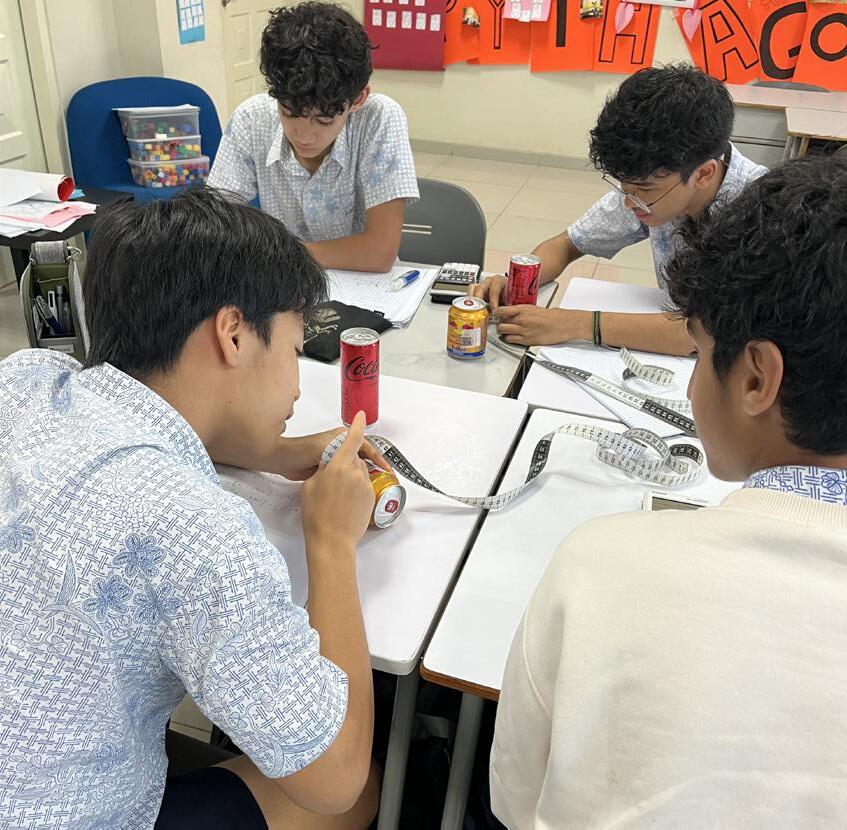
ACG JKT | 11 March Newsletter Mathematics
Year 13 Enthalpy of the reaction between Zinc and Copper Sulphate
In this science activity, students explore the concept of enthalpy of reaction, a measure of the amount of heat released or absorbed during a chemical reaction. Through experimentation, students will learn how to calculate the enthalpy of reaction and understand the significance of this value in chemical reactions. The activity involves measuring the temperature changes of reactants and products using a calorimeter, and using these measurements to calculate the heat transferred during the reaction. By analyzing the data collected, students will be able to determine the enthalpy of reaction and draw conclusions about the nature of the chemical reaction. This engaging activity not only enhances students’ understanding of chemistry concepts but also allows them to apply critical thinking skills and problem-solving techniques in a hands-on learning environment.
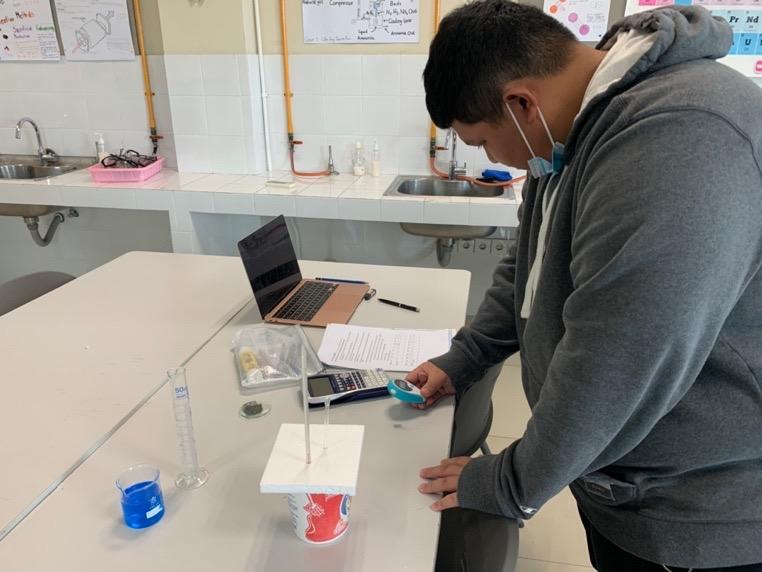
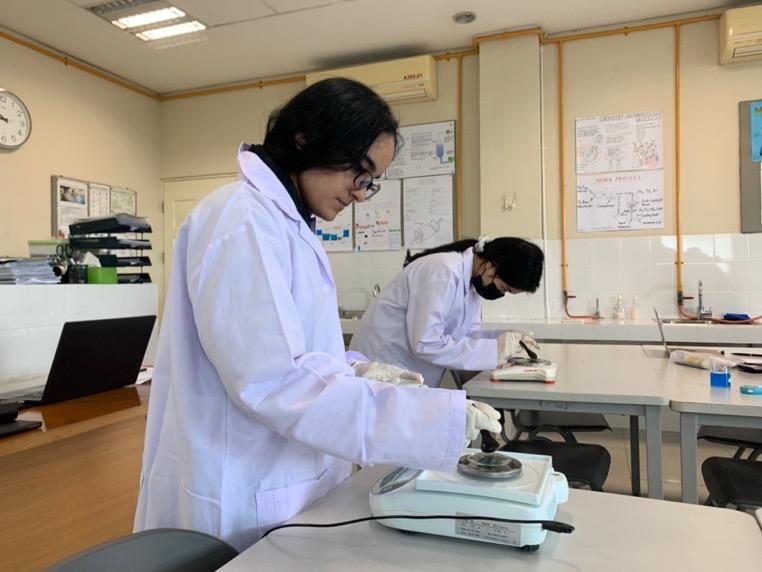
Year 9 Demonstrating Energy Transfer in Trophic Levels through Water Relay
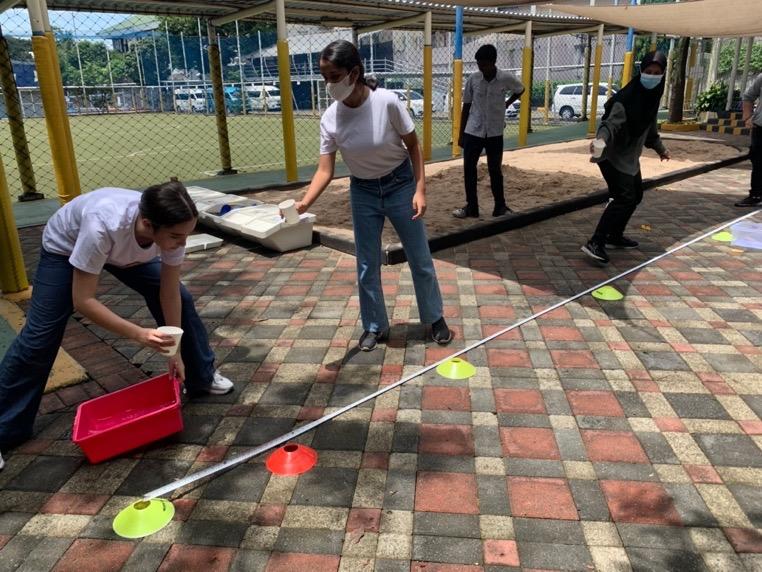
This science activity uses a unique water relay system to showcase the transfer of energy through different trophic levels in an ecosystem. The activity involves filling a holed container with water and placing it above a series of cups. Each cup represents a different trophic level, from primary producers to apex predators. The students then pour water into the top container, simulating the sun’s energy entering the ecosystem. As the water trickles down through the cups, students can observe how the energy is transferred between the different levels. By measuring the water level in each cup and calculating the amount of water transferred, students can quantify the energy flow between the different trophic levels. This engaging activity not only reinforces the concept of trophic levels in an ecosystem but also provides a visual representation of the energy transfer process.
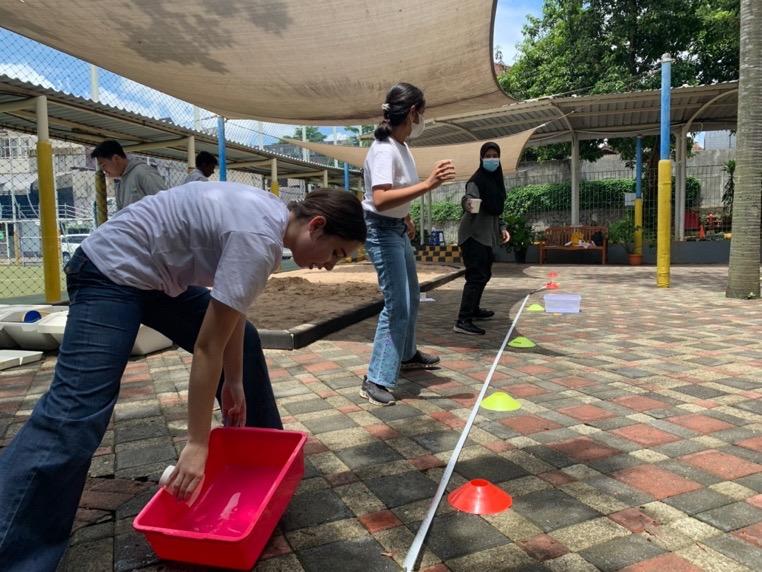
12 | ACG JKT March Newsletter
Science
Donations needed to help children in need
We are Miso & Minnie from Year 6, and as part of our PYP final project we'd like to collect donations to help children living in poverty. We are collecting:
second hand childrens clothes in good condition: eg. tshirts/shirts/ skirts/trousers/jackets/ shoes/trainers school supplies: eg. notebooks/pens/pencils crayons/pencils cases/school backpacks/erasers
Please check your drawers & wardrobes at home and put your donations in a bag.
There will be collections boxes in front of the Year 6 class where you can put your donations. Everyone who makes a donation can take an origami created by us.
All donations will go to an organisation in Jakarta helping children in need of support
Thank you for your support
ACG JKT | 13 February Newsletter
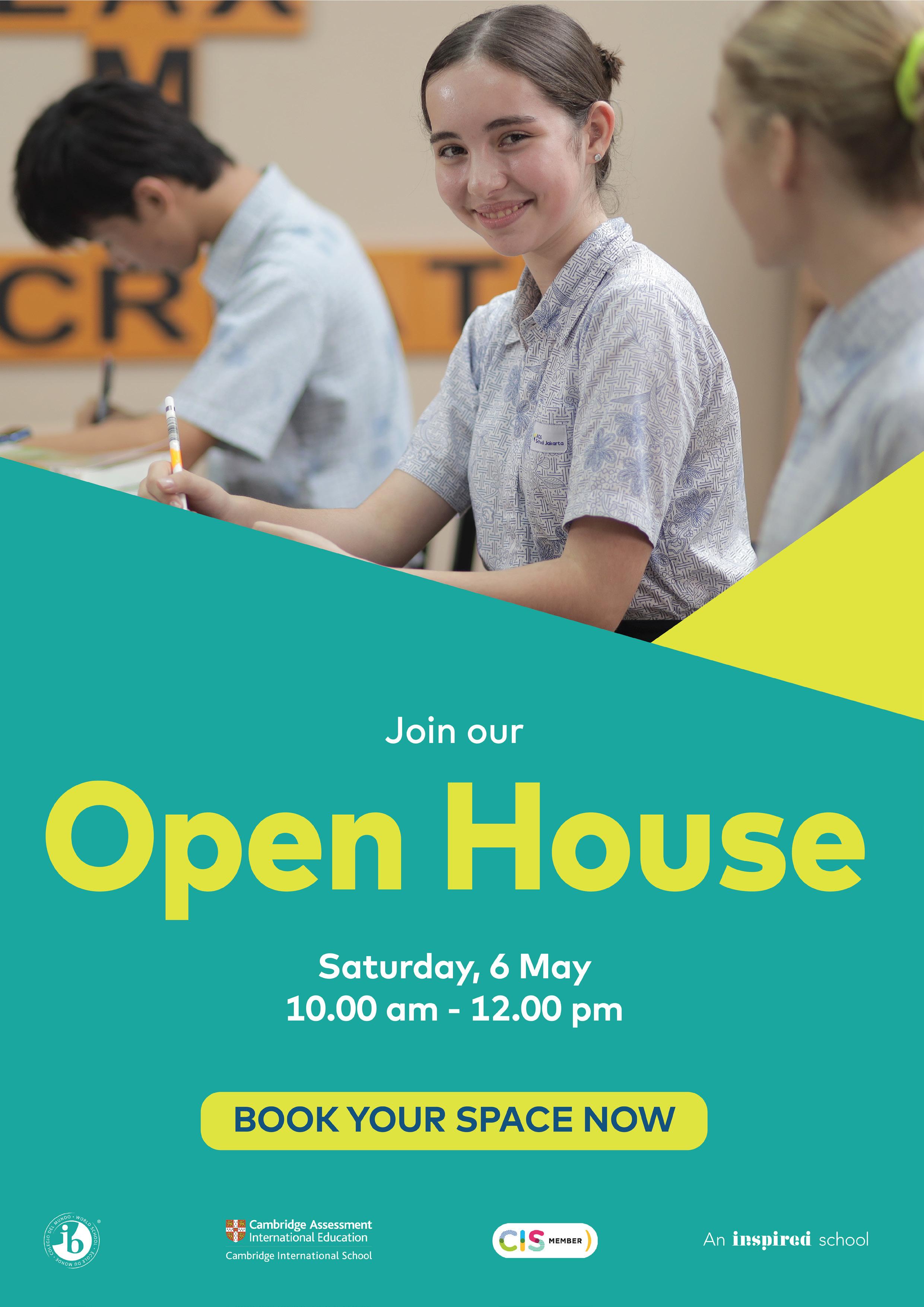
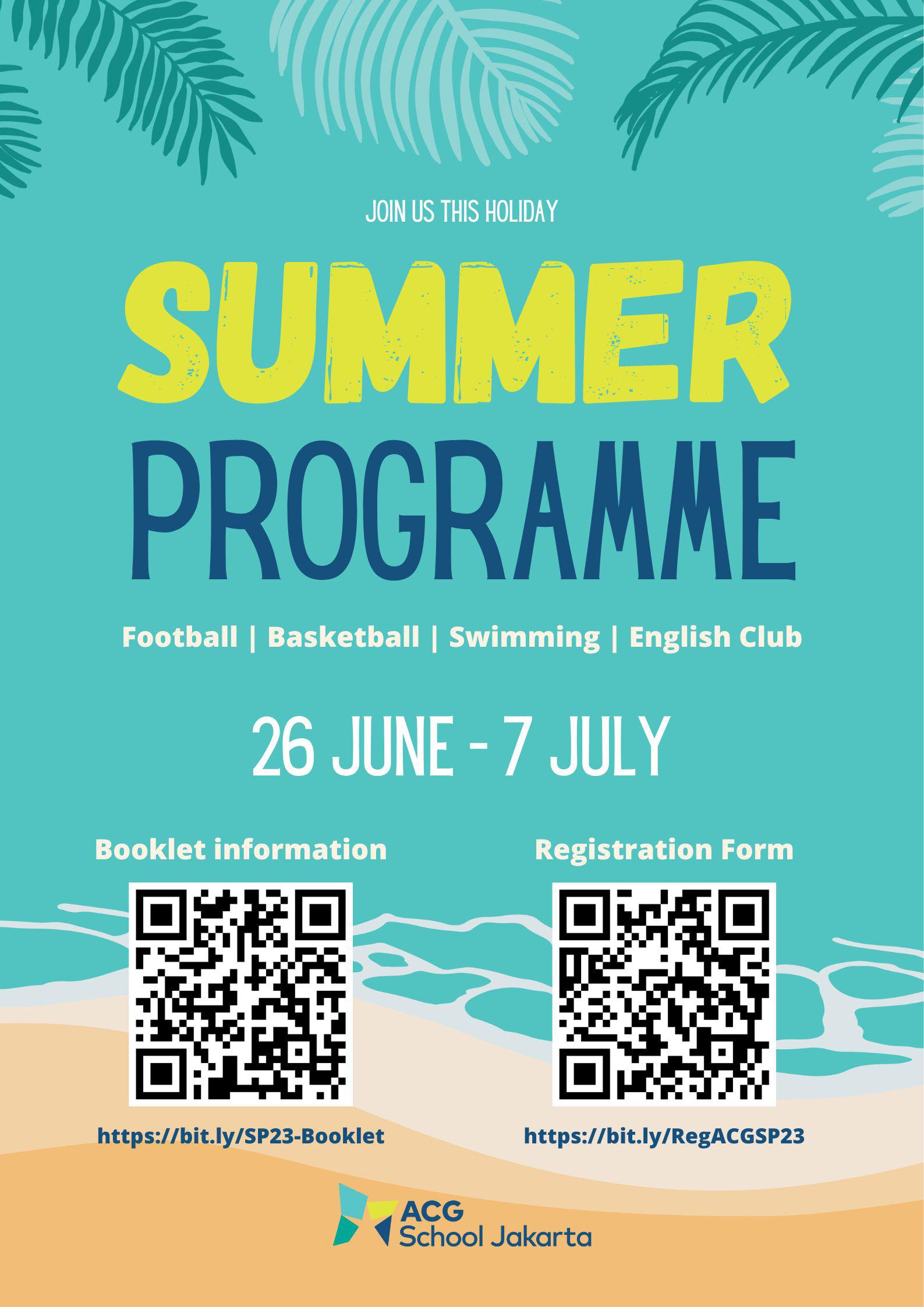











16 | ACG JKT FebruaryACGNewsletter JKT | 17 February Newsletter ACG JKT | 21 August Newsletter August Newsletter ACG JKT August Newsletter 22 | ACG JKT NovemberACGNewsletter JKT | 21 November Newsletter ACG | November Newsletter 24 | ACG JKT November Newsletter ACG JKT | 27 September Newsletter June Newsletter June Newsletter If you have any questions about admissions, please contact: Ms Mia Sari (Mia.Sari@acgedu.com) T: +62 21 2978 0200 | E: acgjkt@acgedu.com | M: +62 816 297 800 Jl Warung Jati Barat (Taman Margasatwa) No 19, Jati Padang, Pasar Minggu, South Jakarta 12540, Indonesia Educate Create Innovate jakarta.acgedu.com ACGJakarta @ACGJakarta ACGJakarta @ACGJakarta ACGSchool Jakarta



















































